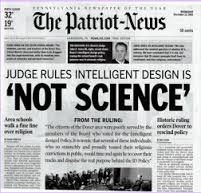 As an organization, NCSE is focused on science education—and as a 501(c)(3) non-profit organization, it tries to stay out of politics as much as possible. With the recent Republican National Convention making headlines though, politics was definitely on my mind this week (and no doubt your mind too!)
As an organization, NCSE is focused on science education—and as a 501(c)(3) non-profit organization, it tries to stay out of politics as much as possible. With the recent Republican National Convention making headlines though, politics was definitely on my mind this week (and no doubt your mind too!)
Without sliding into party politics, or even the most recent presidential election, I thought that it would be fun to delve into our archives to look at “politics past.” So today, take a big step with me back in time, to the year 2005. Where were you and what were you doing?
I was in my first year of graduate school—at the point, in fact, of deciding to switch from a masters to a doctoral program, and trying to convince my advisor it was a good idea. (P.S. It worked!)
Meanwhile, the folks at NCSE were working hard to keep “intelligent design,” the new form of creationism, out of the public schools. It was in the news a lot in the summer of 2005, since the lawsuit in Kitzmiller v. Dover had been filed, and the trial was approaching.
NCSE’s deputy director Glenn Branch wrote a piece that year for Reports of the NCSE (RNCSE) on then-president George W. Bush’s position on “intelligent design”:
During a press conference with a group of Texas reporters on August 1, 2005, President George W Bush responded to a question about teaching “intelligent design” in the public schools. The reporter referred to “what seems to be a growing debate over evolution versus ‘intelligent design’” and asked, “What are your personal views on that, and do you think both should be taught in public schools?” In response, Bush referred to his days as governor of Texas, when “I said that, first of all, that decision should be made to local school districts, but I felt like both sides ought to be properly taught...so people can understand what the debate is about.”
A seemingly politically savvy answer for Bush at the time, perhaps, but also no doubt discouraging to the scientists across the country who heard it. Branch then goes on to suggest that Bush should have sought the advice of his White House science adviser, John Marburger, who had called evolution the “cornerstone of modern biology” and rightly described “intelligent design” as not being a scientific theory. Touché!
Here we are eleven years later, with Kitzmiller v. Dover in the rear view mirror, and yet we still see threats to evolution education routinely popping up all over. Take a look at Branch’s piece and let us know how you think the terrain has changed since then. Do you think politicians are more cognizant of evolution and its role in biology? Do you think we have moved on to larger topics to argue over—such as Zika research funding, the effects of Brexit on international scientific projects, and the Taylor Swift/Kayne West conflict?
Give us your thoughts below—and remember, keep it civil; my mom reads this blog!

